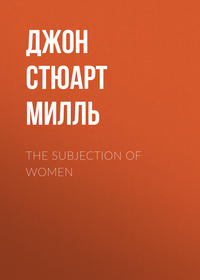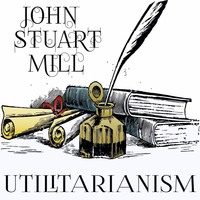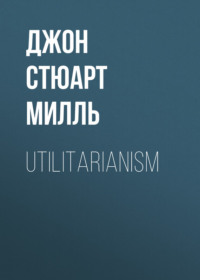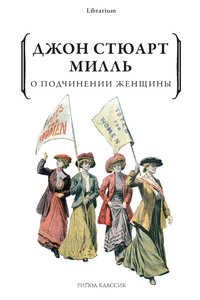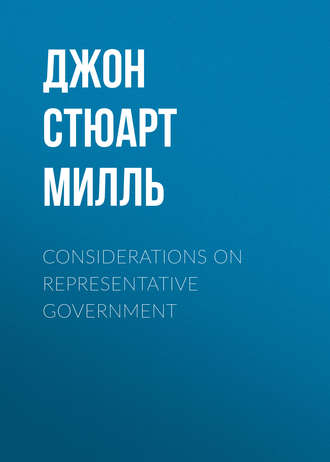 полная версия
полная версияConsiderations on Representative Government
I have discussed this question on the assumption that the electoral system, in all that depends on positive institution, conforms to the principles laid down in the preceding chapters. Even on this hypothesis, the delegation theory of representation seems to me false, and its practical operation hurtful, though the mischief would in that case be confined within certain bounds. But if the securities by which I have endeavoured to guard the representative principle are not recognized by the Constitution; if provision is not made for the representation of minorities, nor any difference admitted in the numerical value of votes, according to some criterion of the amount of education possessed by the voters – in that case, no words can exaggerate the importance in principle of leaving an unfettered discretion to the representative; for it would then be the only chance, under universal suffrage, for any other opinions than those of the majority to be heard in Parliament. In that falsely called democracy which is really the exclusive rule of the operative classes, all others being unrepresented and unheard, the only escape from class legislation in its narrowest, and political ignorance in its most dangerous form, would lie in such disposition as the uneducated might have to choose educated representatives, and to defer to their opinions. Some willingness to do this might reasonably be expected, and every thing would depend upon cultivating it to the highest point. But, once invested with political omnipotence, if the operative classes voluntarily concurred in imposing in this or any other manner any considerable limitation upon their self-opinion and self-will, they would prove themselves wiser than any class possessed of absolute power has shown itself, or, we may venture to say, is ever likely to show itself under that corrupting influence.
Chapter XIII – Of a Second Chamber
Of all topics relating to the theory of representative government, none have been the subject of more discussion, especially on the Continent, than what is known as the question of the Two Chambers. It has occupied a greater amount of the attention of thinkers than many questions of ten times its importance, and has been regarded as a sort of touchstone which distinguishes the partisans of limited from those of uncontrolled democracy. For my own part, I set little value on any check which a Second Chamber can apply to a democracy otherwise unchecked; and I am inclined to think that if all other constitutional questions are rightly decided, it is of comparatively little importance whether the Parliament consists of two Chambers or only of one.
If there are two chambers, they may either be of similar or of dissimilar composition. If of similar, both will obey the same influences, and whatever has a majority in one of the houses will be likely to have it in the other. It is true that the necessity of obtaining the consent of both to the passing of any measure may at times be a material obstacle to improvement, since, assuming both the houses to be representative and equal in their numbers, a number slightly exceeding a fourth of the entire representation may prevent the passing of a bill; while, if there is but one house, a bill is secure of passing if it has a bare majority. But the case supposed is rather abstractedly possible than likely to occur in practice. It will not often happen that, of two houses similarly composed, one will be almost unanimous, and the other nearly equally divided; if a majority in one rejects a measure, there will generally have been a large minority unfavorable to it in the other; any improvement, therefore, which could be thus impeded, would in almost all cases be one which had not much more than a simple majority in the entire body, and the worst consequence that could ensue would be to delay for a short time the passing of the measure, or give rise to a fresh appeal to the electors to ascertain if the small majority in Parliament corresponded to an effective one in the country. The inconvenience of delay, and the advantages of the appeal to the nation, might be regarded in this case as about equally balanced.
I attach little weight to the argument oftenest urged for having two Chambers – to prevent precipitancy, and compel a second deliberation; for it must be a very ill-constituted representative assembly in which the established forms of business do not require many more than two deliberations. The consideration which tells most, in my judgment, in favor of two Chambers (and this I do regard as of some moment), is the evil effect produced upon the mind of any holder of power, whether an individual or an assembly, by the consciousness of having only themselves to consult. It is important that no set of persons should be able, even temporarily, to make their sic volo prevail without asking any one else for his consent. A majority in a single assembly, when it has assumed a permanent character – when composed of the same persons habitually acting together, and always assured of victory in their own House – easily becomes despotic and overweening if released from the necessity of considering whether its acts will be concurred in by another constituted authority. The same reason which induced the Romans to have two consuls makes it desirable there should be two Chambers – that neither of them may be exposed to the corrupting influence of undivided power even for the space of a single year. One of the most indispensable requisites in the practical conduct of politics, especially in the management of free institutions, is conciliation; a readiness to compromise; a willingness to concede something to opponents, and to shape good measures so as to be as little offensive as possible to persons of opposite views; and of this salutary habit, the mutual give and take (as it has been called) between two houses is a perpetual school – useful as such even now, and its utility would probably be even more felt in a more democratic constitution of the Legislature.
But the houses need not both be of the same composition; they may be intended as a check on one another. One being supposed democratic, the other will naturally be constituted with a view to its being some restraint upon the democracy. But its efficacy in this respect wholly depends on the social support which it can command outside the House. An assembly which does not rest on the basis of some great power in the country is ineffectual against one which does. An aristocratic House is only powerful in an aristocratic state of society. The House of Lords was once the strongest power in our Constitution, and the Commons only a checking body; but this was when the barons were almost the only power out of doors. I can not believe that, in a really democratic state of society, the House of Lords would be of any practical value as a moderator of democracy. When the force on one side is feeble in comparison with that on the other, the way to give it effect is not to draw both out in line, and muster their strength in open field over against one another. Such tactics would insure the utter defeat of the less powerful. It can only act to advantage by not holding itself apart, and compelling every one to declare himself either with or against it, but taking a position among the crowd rather than in opposition to it, and drawing to itself the elements most capable of allying themselves with it on any given point; not appearing at all as an antagonist body, to provoke a general rally against it, but working as one of the elements in a mixed mass, infusing its leaven, and often making what would be the weaker part the stronger, by the addition of its influence. The really moderating power in a democratic constitution must act in and through the democratic House.
That there should be, in every polity, a centre of resistance to the predominant power in the Constitution – and in a democratic constitution, therefore, a nucleus of resistance to the democracy – I have already maintained; and I regard it as a fundamental maxim of government. If any people who possess a democratic representation are, from their historical antecedents, more willing to tolerate such a centre of resistance in the form of a Second Chamber or House of Lords than in any other shape, this constitutes a stronger reason for having it in that shape. But it does not appear to me the best shape in itself, nor by any means the most efficacious for its object. If there are two houses, one considered to represent the people, the other to represent only a class, or not to be representative at all, I can not think that, where democracy is the ruling power in society, the second House would have any real ability to resist even the aberrations of the first. It might be suffered to exist in deference to habit and association, but not as an effective check. If it exercised an independent will, it would be required to do so in the same general spirit as the other House; to be equally democratic with it, and to content itself with correcting the accidental oversights of the more popular branch of the Legislature, or competing with it in popular measures.
The practicability of any real check to the ascendancy of the majority depends henceforth on the distribution of strength in the most popular branch of the governing body; and I have indicated the mode in which, to the best of my judgment, a balance of forces might most advantageously be established there. I have also pointed out that, even if the numerical majority were allowed to exercise complete predominance by means of a corresponding majority in Parliament, yet if minorities also are permitted to enjoy the equal right due to them on strictly democratic principles, of being represented proportionally to their numbers, this provision will insure the perpetual presence in the House, by the same popular title as its other members, of so many of the first intellects in the country, that without being in any way banded apart, or invested with any invidious prerogative, this portion of the national representation will have a personal weight much more than in proportion to its numerical strength, and will afford, in a most effective form, the moral centre of resistance which is needed. A second Chamber, therefore, is not required for this purpose, and would not contribute to it, but might even, in some degree, tend to compromise it. If, however, for the other reasons already mentioned, the decision were taken that there should be such a Chamber, it is desirable that it should be composed of elements which, without being open to the imputation of class interests adverse to the majority, would incline it to oppose itself to the class interests of the majority, and qualify it to raise its voice with authority against their errors and weaknesses. These conditions evidently are not found in a body constituted in the manner of our House of Lords. So soon as conventional rank and individual riches no longer overawe the democracy, a House of Lords becomes insignificant.
Of all principles on which a wisely conservative body, destined to moderate and regulate democratic ascendancy, could possibly be constructed, the best seems to be that exemplified in the Roman Senate, itself the most consistently prudent and sagacious body that ever administered public affairs. The deficiencies of a democratic assembly, which represents the general public, are the deficiencies of the public itself, want of special training and knowledge. The appropriate corrective is to associate with it a body of which special training and knowledge should be the characteristics. If one House represents popular feeling, the other should represent personal merit, tested and guaranteed by actual public service, and fortified by practical experience. If one is the People's Chamber, the other should be the Chamber of Statesmen – a council composed of all living public men who have passed through important political office or employment. Such a Chamber would be fitted for much more than to be a merely moderating body. It would not be exclusively a check, but also an impelling force. In its hands, the power of holding the people back would be vested in those most competent, and who would then be most inclined to lead them forward in any right course. The council to whom the task would be intrusted of rectifying the people's mistakes would not represent a class believed to be opposed to their interest, but would consist of their own natural leaders in the path of progress. No mode of composition could approach to this in giving weight and efficacy to their function of moderators. It would be impossible to cry down a body always foremost in promoting improvements as a mere obstructive body, whatever amount of mischief it might obstruct.
Were the place vacant in England for such a Senate (I need scarcely say that this is a mere hypothesis), it might be composed of some such elements as the following: All who were or had been members of the Legislative Commission described in a former chapter, and which I regard as an indispensable ingredient in a well constituted popular government. All who were or had been chief justices, or heads of any of the superior courts of law or equity. All who had for five years filled the office of puisne judge. All who had held for two years any cabinet office; but these should also be eligible to the House of Commons, and, if elected members of it, their peerage or senatorial office should be held in suspense. The condition of time is needed to prevent persons from being named cabinet ministers merely to give them a seat in the Senate; and the period of two years is suggested, that the same term which qualifies them for a pension might entitle them to a senatorship. All who had filled the office of commander-in-chief; and all who, having commanded an army or a fleet, had been thanked by Parliament for military or naval successes. All governors general of India or British America, and all who had held for ten years any colonial governorships. The permanent civil service should also be represented; all should be senators who had filled, during ten years, the important offices of under-secretary to the Treasury, permanent under-secretary of State, or any others equally high and responsible. The functions conferring the senatorial dignity should be limited to those of a legal, political, or military or naval character. Scientific and literary eminence are too indefinite and disputable: they imply a power of selection, whereas the other qualifications speak for themselves; if the writings by which reputation has been gained are unconnected with politics, they are no evidence of the special qualities required, while, if political, they would enable successive ministries to deluge the House with party tools.
The historical antecedents of England render it all but certain that, unless in the improbable case of a violent subversion of the existing Constitution, any second Chamber which could possibly exist would have to be built on the foundation of the House of Lords. It is out of the question to think practically of abolishing that assembly, to replace it by such a Senate as I have sketched or by any other; but there might not be the same insuperable difficulty in aggregating the classes or categories just spoken of to the existing body in the character of peers for life. An ulterior, and perhaps, on this supposition, a necessary step, might be, that the hereditary peerage should be present in the House by their representatives instead of personally: a practice already established in the case of the Scotch and Irish peers, and which the mere multiplication of the order will probably at some time or other render inevitable. An easy adaptation of Mr. Hare's plan would prevent the representative peers from representing exclusively the party which has the majority in the peerage. If, for example, one representative were allowed for every ten peers, any ten might be admitted to choose a representative, and the peers might be free to group themselves for that purpose as they pleased. The election might be thus conducted: All peers who were candidates for the representation of their order should be required to declare themselves such, and enter their names in a list. A day and place should be appointed at which peers desirous of voting should be present, either in person, or, in the usual Parliamentary manner, by their proxies. The votes should be taken, each peer voting for only one. Every candidate who had as many as ten votes should be declared elected. If any one had more, all but ten should be allowed to withdraw their votes, or ten of the number should be selected by lot. These ten would form his constituency, and the remainder of his voters would be set free to give their votes over again for some one else. This process should be repeated until (so far as possible) every peer present either personally or by proxy was represented. When a number less than ten remained over, if amounting to five they might still be allowed to agree on a representative; if fewer than five, their votes must be lost, or they might be permitted to record them in favor of somebody already elected. With this inconsiderable exception, every representative peer would represent ten members of the peerage, all of whom had not only voted for him, but selected him as the one, among all open to their choice, by whom they were most desirous to be represented. As a compensation to the peers who were not chosen representatives of their order, they should be eligible to the House of Commons; a justice now refused to Scotch peers, and to Irish peers in their own part of the kingdom, while the representation in the House of Lords of any but the most numerous party in the peerage is denied equally to both.
The mode of composing a Senate which has been here advocated not only seems the best in itself, but is that for which historical precedent and actual brilliant success can to the greatest extent be pleaded. It is not however the only feasible plan that might be proposed. Another possible mode of forming a Second Chamber would be to have it elected by the First; subject to the restriction that they should not nominate any of their own members. Such an assembly, emanating, like the American Senate, from popular choice only once removed, would not be considered to clash with democratic institutions, and would probably acquire considerable popular influence. From the mode of its nomination, it would be peculiarly unlikely to excite the jealousy of, or to come into hostile collision with the popular House. It would, moreover (due provision being made for the representation of the minority), be almost sure to be well composed, and to comprise many of that class of highly capable men who, either from accident or for want of showy qualities, had been unwilling to seek, or unable to obtain, the suffrages of a popular constituency.
The best constitution of a Second Chamber is that which embodies the greatest number of elements exempt from the class interests and prejudices of the majority, but having in themselves nothing offensive to democratic feeling. I repeat, however, that the main reliance for tempering the ascendancy of the majority can be placed in a Second Chamber of any kind. The character of a representative government is fixed by the constitution of the popular House. Compared with this, all other questions relating to the form of government are insignificant.
Chapter XIV – Of the Executive in a Representative Government
It would be out of place in this treatise to discuss the question into what departments or branches the executive business of government may most conveniently be divided. In this respect the exigencies of different governments are different; and there is little probability that any great mistake will be made in the classification of the duties when men are willing to begin at the beginning, and do not hold themselves bound by the series of accidents which, in an old government like ours, has produced the existing division of the public business. It may be sufficient to say that the classification of functionaries should correspond to that of subjects, and that there should not be several departments independent of one another, to superintend different parts of the same natural whole, as in our own military administration down to a recent period, and in a less degree even at present. Where the object to be attained is single (such as that of having an efficient army), the authority commissioned to attend to it should be single likewise. The entire aggregate of means provided for one end should be under one and the same control and responsibility. If they are divided among independent authorities, the means with each of those authorities become ends, and it is the business of nobody except the head of the government, who has probably no departmental experience, to take care of the real end. The different classes of means are not combined and adapted to one another under the guidance of any leading idea; and while every department pushes forward its own requirements, regardless of those of the rest, the purpose of the work is perpetually sacrificed to the work itself.
As a general rule, every executive function, whether superior or subordinate, should be the appointed duty of some given individual. It should be apparent to all the world who did every thing, and through whose default any thing was left undone. Responsibility is null when nobody knows who is responsible; nor, even when real, can it be divided without being weakened. To maintain it at its highest, there must be one person who receives the whole praise of what is well done, the whole blame of what is ill. There are, however, two modes of sharing responsibility; by one it is only enfeebled, by the other absolutely destroyed. It is enfeebled when the concurrence of more than one functionary is required to the same act. Each one among them has still a real responsibility; if a wrong has been done, none of them can say he did not do it; he is as much a participant as an accomplice is in an offense: if there has been legal criminality, they may all be punished legally, and their punishment needs not be less severe than if there had been only one person concerned. But it is not so with the penalties any more than with the rewards of opinion; these are always diminished by being shared. Where there has been no definite legal offense, no corruption or malversation, only an error or an imprudence, or what may pass for such, every participator has an excuse to himself and to the world in the fact that other persons are jointly involved with him. There is hardly any thing, even to pecuniary dishonesty, for which men will not feel themselves almost absolved, if those whose duty it was to resist and remonstrate have failed to do it, still more if they have given a formal assent.
In this case, however, though responsibility is weakened, there still is responsibility: every one of those implicated has in his individual capacity assented to, and joined in the act. Things are much worse when the act itself is only that of a majority – a board deliberating with closed doors, nobody knowing, or, except in some extreme case, being ever likely to know, whether an individual member voted for the act or against it. Responsibility in this case is a mere name. "Boards," it is happily said by Bentham, "are screens." What "the Board" does is the act of nobody, and nobody can be made to answer for it. The Board suffers, even in reputation, only in its collective character; and no individual member feels this further than his disposition leads him to identify his own estimation with that of the body – a feeling often very strong when the body is a permanent one, and he is wedded to it for better for worse; but the fluctuations of a modern official career give no time for the formation of such an esprit de corps, which, if it exists at all, exists only in the obscure ranks of the permanent subordinates. Boards, therefore, are not a fit instrument for executive business, and are only admissible in it when, for other reasons, to give full discretionary power to a single minister would be worse.
On the other hand, it is also a maxim of experience that in the multitude of councillors there is wisdom, and that a man seldom judges right, even in his own concerns, still less in those of the public, when he makes habitual use of no knowledge but his own, or that of some single adviser. There is no necessary incompatibility between this principle and the other. It is easy to give the effective power and the full responsibility to one, providing him when necessary with advisers, each of whom is responsible only for the opinion he gives.




